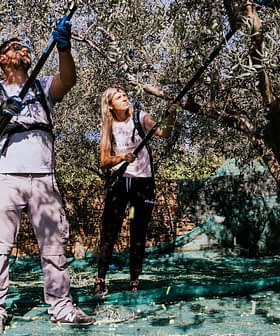The ancient city of Jerusalem will host the third edition of TerraOlivo between the 6th and 8th of June.
TerraOlivo 2012 (Mediterranean International Olive Oil Competition), which will stage at the Crowne Plaza Hotel in Jerusalem, closed its first edition in 2010 with 189 olive juices from 17 countries.
The objectives of these awards are to recognize the best extra virgin olive oils from around the world, promoting their nutritional benefits, enhance their markets and international consumption, and spread the benefits of the Mediterranean diet.
The prizes awarded in the contest are Mediterranean Olive Oil Grand Prestige Gold, Prestige Gold Mediterranean Olive Oil and Mediterranean Olive Oil Gold.
In addition, special prizes are also awarded for Best of Category, International Grand Prix, Grand Corporation Prix, Best Olive Oil in Israel in each of the varietals rewarded, Best Great Society in Israel, Best Small Family Society of Israel and Country Award.
Many Israeli producers of olive oil had the first opportunity to analyze their olive juices in 2010, in the first edition TerraOlivo through the work of expert tasters from 14 countries with extensive experience in the olive oil sector, like Greece, Italy and Spain, which this year will be represented by Juan A. Peñamil, editor of Mercacei Magazine.
In this third edition, organizer Moshe Spak, has brought forward that the list of countries from which the expert tasters will proceed has been extended to new markets such as California.
Olive oil press from 1,400 years old found in Israel
It seems a good time for this celebration, coinciding by chance with the finding of an olive press of 1,400 years old in an archaeological dig in the city of Modiin (Israel). The press was discovered by archaeologists employed by the Israel Antiquities Authority in the neighborhood near Kaiser.
Turga Hagit, who runs the place, said “the ancient and large (48 square meters) olive press, which produced olive oil in industrial quantities for consumption and lighting, was perfectly preserved with all its components intact. This includes a grinding mechanism for squeezing olives initially, a pressing mechanism with two pillars used to stabilize a heavy cylinder that crushed olives and a screw base used to operate the cylinder. The olive oil was collected in a basin that has also been preserved intact. Other small items of marble and pottery were found in the place.”
The Israel Antiquities Authority, the Ministry of Housing and Construction and the municipality of Maccabim-Reut are cooperating to keep the discovery and show it to the local residents. Soon, there will be a visitor area built near the park near Anava.








